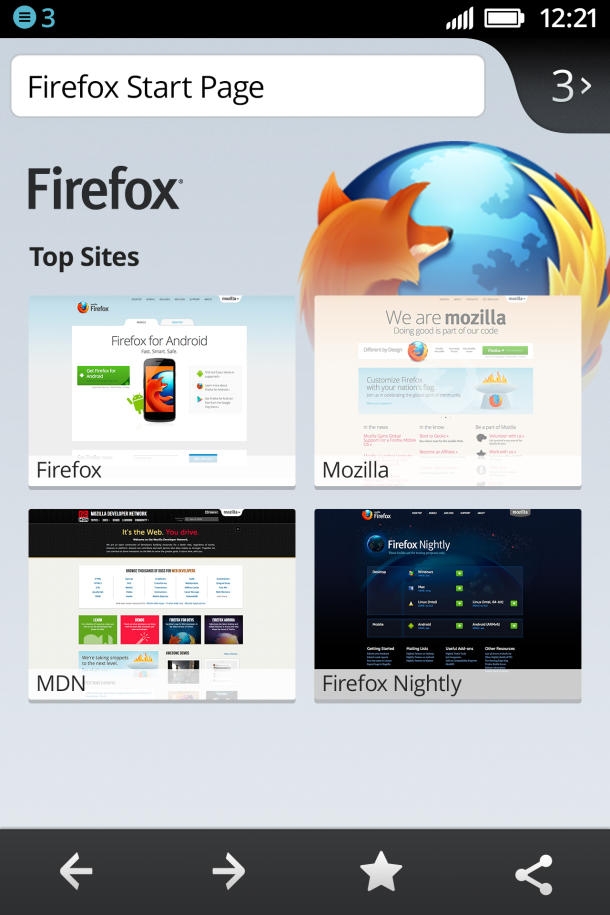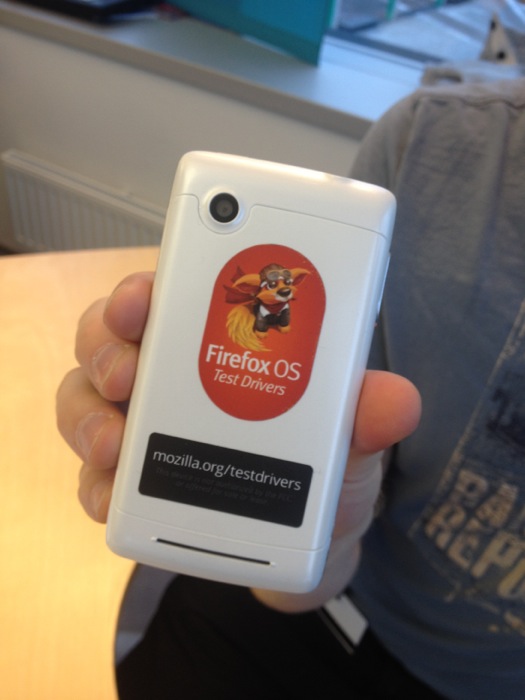Mozilla developers: “If you don’t want to pay 30% tax, you will like Firefox OS!” Include an open-source alternative to iOS and Android in your plans!

On Habré already several times mentioned Firefox OS . Today I came across some interesting English-language articles about why it was created, about a possible future , as well as the Mozilla infographic on 2012 results . I hope the material will be interesting.
Recently, Mozilla made a statement that it will soon make Firefox OS available to users of mobile devices, and that it needs developers from iOS and Android. Mozilla creates an open source mobile OS that challenges Apple and Android.
Developers are preparing to develop applications for Firefox OS
Jay Sullivan, vice president of Mozilla products, at the Mobile Monday Mixer event (which brought together 75 HTML5, JavaScript, and CSS developers) , said:
')
“If you want to develop mobile apps and don’t pay 30% tax [which takes Apple], you will like Firefox OS . ”
He also mentioned that Mozilla created a “payment API” for regular web browsers, with which they can work with payments in the same way that mobile apps usually do.
Mozilla expects that this development will lead to the creation of numerous application stores in which developers can offer their applications directly to end users.
Firefox OS is completely based on JavaScript, CSS, HTML5, and code models (code frameworks) that are already known to developers. On this occasion, Sullivan said:
“No new ecosystem will be born if developers have to learn too many new things.”
Compared to other mobile operating systems (iOS and Android), Firefox OS will be much easier for developers . “The point is not to incite people to create HTML5 applications, but rather to make applications optimized for mobile use .”
But the opinion of Gary Kovacs, Mozilla Chief Executive:
Right now the network has 2.5 billion people , and the success of Mozilla will attract another 2.5 billion new users. Firefox OS will be "just as punchy as Firefox ."
“Our mission is to offer modern web technologies that eliminate artificial barriers for users and developers. Firefox OS will help make smartphones affordable for the entire billions of users who are expected to join the network in the next few years . "
Firefox OS challenges closed mobile ecosystems
The market for smartphones and tablets today revolves around several ecosystems of such heavyweights as Apple, Google and Microsoft . These ecosystems are more or less closed, and most applications for iOS, Android, or Windows Phone are created in a targeted manner. But with the increasing number of devices and ecosystems, it becomes more and more expensive for developers to create native applications for each of them . Wouldn't it be great in the future to use an open web platform for mobile devices?
The real work is already underway - one of the major European telecoms, Telefonica , already has a development team; another operator, Telenor, some time ago, confirmed the support of Firefox OS.

How did it all start?
In the summer of 2011, Mozilla announced a project codenamed Boot-to-Gecko (B2G) , with the goal of bringing open web standards to mobile devices, where all user-accessible programs are built using advanced HTML5 technologies, and there is an API to work with equipment through Javascript The technology itself was called Firefox OS.
Firefox OS consists of 3 main components: Gaia, Gecko and Gonk .
- Gaia is the topmost OS level, responsible for the Firefox OS interface. It is fully developed using HTML, CSS and JavaScript, and uses open web APIs to the Gecko level.
- Gecko is an application runtime environment, including network stack, graphics stack, markup engine, JavaScript virtual machine, and porting levels.
- Gonk - consists of a Linux kernel and an abstract hardware user space layer, a Gecko engine port, similar to ports for MacOS or Windows.
Together, Gaia, Gecko and Gonk provide a complete web-based runtime environment for mobile devices. Firefox OS, in comparison with Android, contains less software layers , which allows us to expect better relative performance, which, by the way, is shown by the results of the first tests.

What does this mean for the industry? Why should people believe in Firefox OS?
One of the main reasons for innovation that occurred on the Internet over the past 20 years could be the lack of individuals or institutions that would dictate what the Internet could be used for and from which devices. Anyone can create a website, a new online service, or invent a new business model.
Today’s mobile ecosystems , although to a certain extent they have grown from the web, but still they don’t look like a really open web. Creating native applications today means adopting guidelines and constraints that determine which services can be developed and how they should look. In the short term, for users it should be a blessing, because they get tested applications that are easy to use. But in a long-term perspective, this can be an obstacle to innovation , which will be limited to the framework of rules that convey all the decision-making capabilities of a small group of powerful corporations.
The mother of all ecosystems is still (and will continue to be) the Internet.
The Internet, as a comprehensive communication environment, creates powerful network effects, and mobile ecosystems, from this point of view, are only islands in this ocean. Today, HTML5 + JavaScript is a key platform for developing web-service applications, and many believe that it will be the same for mobile services too.
Despite the fact that native (native) applications can work better at the moment, the development of browser technologies can lead to the fact that the performance of web and native applications will become even after a couple of years. Ideally, applications should appear that are built using open technology standards and that can be used on all devices, including smartphones. This will give users more choices.
Firefox OS is trying to move the freedom of the Internet into a mobile ecosystem , allowing everyone to create web applications just as they create web pages . There are several players in the industry who have an interest in building an open alternative to closed ecosystems , and this can help Firefox OS to gain a critical mass of users to attract developers to include in their plans to adapt their applications for Firefox OS.
Of course, success is not guaranteed, and it is brave to challenge existing mobile ecosystems. But in today's Internet industry there is no consistency, devices are constantly evolving and evolving and integrating, and users can use them in unexpected ways .
Mozilla evaluates 2012 results and looks forward to the success of Firefox OS in 2013
And, in conclusion - a curious infographics: ( source )


Want to participate in the development of Firefox OS?
Comoyo and Telenor Digital Services, which support this initiative, are looking for great people, and developer jobs are open .
Or maybe there are those who want to try to create their own web application? Then this instruction will help you .
Earlier on Habré:
- R2D2B2G, Ready to Deliver to Boot to Gecko
- Already available emulator Firefox OS
- survey: Do you think that Firefox OS will be able to take a large share of the mobile OS market?
- There is something magical in Firefox OS
Additionally:
- Mozilla Developer Network: Firefox OS
- Mozilla Blog: Mozilla in 2012
- Mozilla to developers: Come build apps for Firefox OS!
- ComoYo: Firefox OS challenges the closed mobile ecosystems
- Ecosystem battles: how technological empires can start a war to control the digital life of users
Firefox OS - is it good for the industry?
Will you experiment with this platform in the near future?
Source: https://habr.com/ru/post/163223/
All Articles